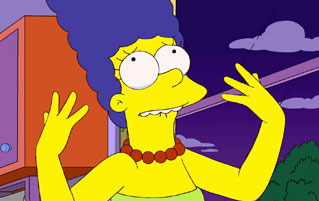4 WTF True Stories Behind the Traits of Famous Characters

It's tempting to think that the inspiration for all the best bits of modern pop culture was beamed down from the heavens directly into the minds of genius artists because the universe felt that life just wouldn't have made sense otherwise. But the truth is, even great pieces of fiction can sometimes be the result of a series of bizarrely bad decisions and idiotic ideas, and nowhere has this been more evident than with the origins of iconic fictional characters. For example ...
Marge Simpson Has Such Big Hair Because She Was Originally Meant to Be a Rabbit

With all the insanity that permeates every episode of The Simpsons, it seems childishly pedantic to criticize something as insignificant as the main characters' hairdos, which is why I'm going to do that right now. What the hell is up with all the weird hairdos in the Simpson family? It just makes no sense: Homer has a comb-over with only three strands of hair; Bart, Lisa, and Maggie can't even tell themselves where their skin ends and their hair begins; and, as for Marge -- my God, how can a person live her life with hair the size of King Kong's dick?

But, according to the audio commentary for the episode "Selma's Choice," there is a perfectly rational explanation for Marge Simpson's iconic look. Apparently, all that hair was originally meant to conceal a pair of rabbit ears, and for all of you needy bastards who insist on fancy stuff like context: it actually turns out that this was all part of M. Night Groening's plan to reveal in the final episode of the series that Marge Simpson isn't human at all but, in fact, an anthropomorphic rabbit. (The funniest thing about that is Groening thinking that The Simpsons would actually end one day. Bless his heart.)
The whole idea actually goes back to Matt Groening's Life in Hell, a comic strip featuring a bunch of anthropomorphic rabbits and two gay guys wearing fez hats, because randomness equals comedy.

All right, all right; I actually do like Life in Hell and wish it had its own TV series, but where I merely wished, Groening acted by trying to sneak a character from the comic into The Simpsons. That's right: Marge wasn't supposed to be just a random cartoon rabbit. She was meant to be a character straight out of Life in Hell. But then he had time to think about it and decided that the idea was just too silly for a cartoon that, while admittedly out there at times, does generally strive for semi-realistic humor. He still gave Marge rabbit ears in The Simpsons Arcade Game, because, as mentioned before, randomness equals ORANGE PORCUPINE MITTENS!

Thankfully, that was the last time anyone would try to combine Marge Simpson and rabbits to create something truly disturbing ...

Seriously, whose idea was this?
The Incredible Hulk Is Sometimes Called "David" Because "Bruce" Is "Too Gay"

Prejudice against gay people is never funny, but sometimes you come across homophobia that's so misguided and unrelated to anything in the real world that you just can't get angry at it. Instead, you want to grab its face, pull it closer to you, and ask what combination of booze and locked basements has made it this way, which naturally brings me to the 1978 TV series The Incredible Hulk. You know, the one where Hulk looked as if he was in a hair metal band.

The thing that I love most about this show is that it still manages to keep your attention while mainly focusing on Bill Bixby's character, Dr. David Banner, the man behind the Hulk. They really emphasize the loneliness that he feels as he isolates himself from society out of fear that his alter ego will hurt an innocent person. Now, try to guess which part of what I just wrote has anything to do with homophobia, then immediately give up because it was actually the offhand mention that Bixby's character is named David Banner.
Some of you might have already noticed that this is not Dr. Banner's first name, which has always been Bruce, or if you want to get technical, Robert Bruce.

The point is that Dr. Banner has never been called David, unless you're talking about Hulk's father in the 2003 movie, which we're not, so why even bring it up, me? So ... why was the name changed for the TV show? Well, rumor has it that Kenneth Johnson, the show's creator, producer, writer, director, and probably janitor, didn't want to use the name Bruce because he thought that it sounded too stereotypically gay. As in, he apparently knew so many flaming gay guys named Bruce that he opted not to call his main character that out of fear that the audience would confuse his show for an episode of The Brady Bunch Hour or something. You know, Kenneth, that's awfully judgmental for a guy fucking named Johnson.
You'd think a man who knows comics wouldn't dare to say anything negative about a name shared by Batman, but he was probably too distracted by yet another chart-topping album from a certain flamboyantly gay rock star and his E Street Band. Though, admittedly, Johnson wasn't the only person to ever look at Hulk and have his thoughts jump straight to homosexuality from a springboard shaped like an erect penis. For example, in 1980, Marvel Comics did pretty much the exact same thing, the result of which was a horrifying comic about Bruce Banner almost getting man-raped in the YMCA showers.

Fonzie's Leather Jacket Is For Safety Only

Some of you might not recognize the name Arthur Fonzarelli, but a few decades back, he was one of the most popular characters on all of television (that's right: both channels). Actually, he was more than that. For years, Fonzie -- played by Henry Winkler on the hit ABC show Happy Days -- was basically the first thing that people thought of when they heard the word "cool."

And when those same people heard the name Fonzie, the first thing they thought of was his signature leather jacket or motorcycle, with which he was inseparable. It did make sense for the character, seeing as he was supposed to be an auto mechanic and an ex-gang member, but that's not why he was constantly getting around on a two-wheeler instead of, say, in a muscle car. It was because ABC worried that without straddling a steel contraption powered by continuous explosions inches away from his dick, Fonzie would look too much like a dangerous hoodlum, what with his leather jacket and all.

Despite Happy Days only pretending to take place in the '50s, ABC executives apparently decided to also adopt the moral values of those times and impose them on the show for realism's sake, I assume. It's the only explanation for why they considered a plain leather jacket to be the symbol of violence and criminal intent, and feared that if one of the stars of the show wore it, he might corrupt their impressionable audience.
So series creator Garry Marshall found himself having to convince ABC to let him keep the garment, because he understood that showing Fonzie without his leather jacket would be like serving delicious ice cream in a cone made out of dog turds and your grandmother's ashes. In the end, he sold them on the idea that the jacket was safety gear for the motorcycle. What motorcycle? The one he suddenly decided to make Fonzie ride all the freaking time, including into people's houses.

But as the character's popularity grew, so did the audience's belief that Fonzie probably wouldn't carve his initials into Richie Cunningham's ass to mark him as his bitch, and soon he was allowed to wear his "dangerous" jacket without being near a motorcycle ... right around the time Sara Jane Moore tried to assassinate President Ford! COINCIDENCE?!
Disney Created a Duck Named Donald Because Cricket Is Silly

There are only two reasons why Mickey Mouse is a bigger Disney name than Donald Duck. For starters, he was Walt Disney's first big hit, and you always have a soft spot for your first, even if he did start out as an attempted murderer/rapist. Second, it's just easier to make an instantly recognizable logo out of Mickey, but other than that, there's no reason for one always getting top billing over the other, because Donald is clearly the more interesting character.
Sure, on the surface he's just a bird with a severe anger-management problem, but there's this crazy optimism and pigheaded determination to him that make for some fantastic stories.

I should know, because I read all of them. Donald Duck comics are insanely huge in Europe, and I used to read them religiously as a kid. And, in all that time, I guess I convinced myself that the character could work only as a duck, because real-life ducks are very goofy animals, but they can also be vicious dicks, just like Donald. It made sense to me back then, but that's apparently not what Disney was going for when he created the character. If you believe the numerous industry rumors, Donald Duck's origin actually traces back to an Australian cricketer named Donald Bradman.

Bradman is widely considered one of the greatest batsmen in the history of cricket, which I will now talk about as if it was baseball to speed things along, and to piss off my British and Australian readers. So, in 1932 (two years before Donald's first appearance) Bradman was playing in America, scoring plenty of home runs and getting on base, etc., until his team played against the New York West Indians. That's when Bradman got his three strikes and was inexplicably out of the game, which the news outlets reported as Bradman being out for "a duck" (a cricket term meaning he scored zero points). Legend goes that Disney read about it somewhere, and it was that proximity of the words "Donald" and "duck" that went on to inspire the creation of the original Angry Bird.
If the rumors are true, then it means that Donald Duck wouldn't exist if not for silly cricket terminology and a freak off day for one of the greatest professional athletes ever. In any case, let's just be glad that on that fateful day, Bradman wasn't out for "a Chinaman" or "a rabbit," because it's hard to say which of the two would have yielded the more racist result.

The rabbit, definitely.
Cezary Jan Strusiewicz is a Cracked columnist and editor. Contact him at c.j.strusiewicz@gmail.com.
For more from Cezary, check out 4 Pop Culture Icons Who Were Originally Meant to Be Women. And then check out 15 Unexpected Origins of Famous Ideas.
Spread these origin stories. Click the Facebook 'share' button below.
